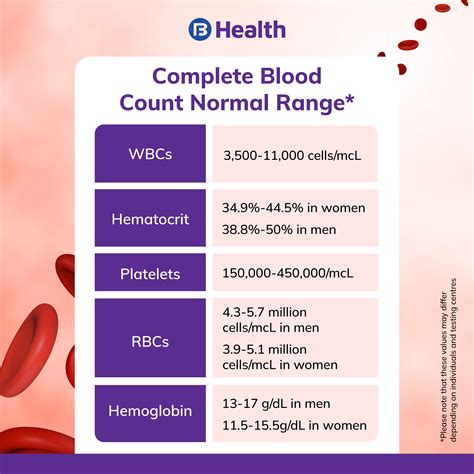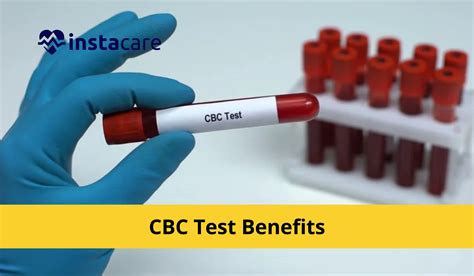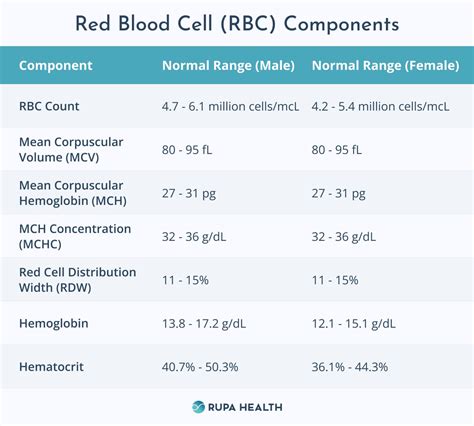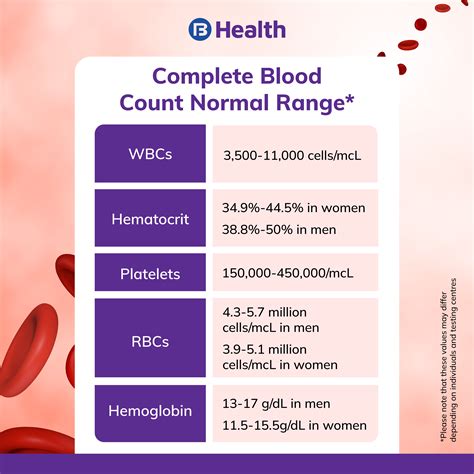Intro
Unlock the secrets of your health with a Complete Blood Count (CBC) Check, analyzing blood components, white blood cell count, and platelet count to diagnose anemia, infection, and inflammation, ensuring accurate diagnosis and effective treatment.
The complete blood count (CBC) check is a fundamental medical test that provides valuable insights into the body's overall health. It is a comprehensive test that measures various components of the blood, including red blood cells, white blood cells, platelets, and hemoglobin. The CBC check is a crucial diagnostic tool that helps healthcare professionals diagnose and monitor a wide range of medical conditions, from anemia and infections to blood disorders and cancer. In this article, we will delve into the world of complete blood count checks, exploring their importance, benefits, and what the results can reveal about our health.
The CBC check is a common test that is often performed as part of a routine medical examination or when a patient presents with symptoms such as fatigue, weakness, or bleeding. The test is usually conducted on a blood sample drawn from a vein in the arm, and the results are typically available within a few hours. The CBC check provides a wealth of information about the blood's cellular composition, including the number, size, and shape of red and white blood cells, platelets, and hemoglobin. This information can help healthcare professionals identify abnormalities in the blood, which can be indicative of underlying medical conditions.
The importance of CBC checks cannot be overstated. These tests have been instrumental in diagnosing and managing a wide range of medical conditions, from mild anemia to life-threatening blood disorders. By analyzing the results of a CBC check, healthcare professionals can gain valuable insights into the body's immune system, blood clotting mechanisms, and overall health. Moreover, CBC checks can help identify potential health risks, such as infections, inflammation, and bleeding disorders, allowing for early intervention and treatment. With the increasing prevalence of medical conditions such as anemia, blood cancers, and autoimmune disorders, the role of CBC checks in maintaining public health has never been more critical.
What is a Complete Blood Count Check?

A complete blood count check is a medical test that measures various components of the blood, including red blood cells, white blood cells, platelets, and hemoglobin. The test is usually performed on a blood sample drawn from a vein in the arm, and the results are typically available within a few hours. The CBC check provides a comprehensive overview of the blood's cellular composition, including the number, size, and shape of red and white blood cells, platelets, and hemoglobin. This information can help healthcare professionals identify abnormalities in the blood, which can be indicative of underlying medical conditions.
Components of a Complete Blood Count Check
The CBC check measures several components of the blood, including: * Red blood cells (RBCs): These cells carry oxygen from the lungs to the body's tissues. * White blood cells (WBCs): These cells play a crucial role in the immune system, helping to fight infections and diseases. * Platelets: These cells help the blood to clot, preventing excessive bleeding. * Hemoglobin (Hb): This protein carries oxygen from the lungs to the body's tissues. * Hematocrit (Hct): This measures the proportion of red blood cells in the blood. * Mean corpuscular volume (MCV): This measures the average size of red blood cells. * Mean corpuscular hemoglobin (MCH): This measures the average amount of hemoglobin in red blood cells. * Mean corpuscular hemoglobin concentration (MCHC): This measures the average concentration of hemoglobin in red blood cells.Benefits of a Complete Blood Count Check

The benefits of a complete blood count check are numerous. These tests can help healthcare professionals diagnose and monitor a wide range of medical conditions, from anemia and infections to blood disorders and cancer. The CBC check can also help identify potential health risks, such as infections, inflammation, and bleeding disorders, allowing for early intervention and treatment. Moreover, CBC checks can provide valuable insights into the body's immune system, blood clotting mechanisms, and overall health.
Some of the benefits of a CBC check include:
- Diagnosing and monitoring medical conditions such as anemia, blood cancers, and autoimmune disorders.
- Identifying potential health risks, such as infections, inflammation, and bleeding disorders.
- Providing valuable insights into the body's immune system, blood clotting mechanisms, and overall health.
- Helping healthcare professionals develop personalized treatment plans for patients.
- Monitoring the effectiveness of treatments and medications.
How to Prepare for a Complete Blood Count Check
Preparing for a CBC check is relatively straightforward. Patients are usually required to: * Fast for 8-12 hours before the test. * Avoid drinking alcohol and caffeine for 24 hours before the test. * Inform their healthcare provider about any medications or supplements they are taking. * Wear comfortable clothing and avoid tight clothing that may interfere with the blood draw.Understanding the Results of a Complete Blood Count Check

Understanding the results of a CBC check can be complex, but it is essential to grasp the basics. The results of a CBC check are usually presented in a table or graph, with each component measured and compared to a reference range. The reference range is the normal range of values for each component, and it may vary depending on the laboratory and the individual's age, sex, and medical history.
Some common abnormal results of a CBC check include:
- Anemia: A low red blood cell count or hemoglobin level.
- Infection: A high white blood cell count.
- Blood clotting disorders: A low platelet count or abnormal platelet function.
- Blood cancers: An abnormal white blood cell count or morphology.
Common Abnormalities in a Complete Blood Count Check
Some common abnormalities in a CBC check include: * Anemia: A low red blood cell count or hemoglobin level. * Leukocytosis: A high white blood cell count. * Leukopenia: A low white blood cell count. * Thrombocytosis: A high platelet count. * Thrombocytopenia: A low platelet count.Limitations and Risks of a Complete Blood Count Check

While CBC checks are valuable diagnostic tools, they have some limitations and risks. Some of the limitations of a CBC check include:
- False negatives: A CBC check may not detect all medical conditions, especially in the early stages.
- False positives: A CBC check may indicate an abnormal result when there is no underlying medical condition.
- Interference from medications: Certain medications may interfere with the results of a CBC check.
- Laboratory errors: Errors in the laboratory may affect the accuracy of the results.
Some of the risks of a CBC check include:
- Bleeding or bruising at the needle site.
- Infection at the needle site.
- Allergic reactions to the antiseptic or needle.
- Fainting or dizziness due to the blood draw.
Alternatives to a Complete Blood Count Check
In some cases, alternatives to a CBC check may be used, such as: * Blood smear: A test that examines the morphology of red and white blood cells. * Bone marrow biopsy: A test that examines the bone marrow for abnormalities. * Molecular tests: Tests that examine the genetic material of blood cells.FAQs

What is a complete blood count check?
+A complete blood count check is a medical test that measures various components of the blood, including red blood cells, white blood cells, platelets, and hemoglobin.
Why is a complete blood count check important?
+A complete blood count check is important because it provides valuable insights into the body's overall health, helping to diagnose and monitor a wide range of medical conditions.
How do I prepare for a complete blood count check?
+To prepare for a complete blood count check, patients should fast for 8-12 hours, avoid drinking alcohol and caffeine, and inform their healthcare provider about any medications or supplements they are taking.
In conclusion, a complete blood count check is a valuable diagnostic tool that provides insights into the body's overall health. By understanding the benefits, limitations, and risks of a CBC check, patients can make informed decisions about their health. If you have any questions or concerns about a CBC check, consult with your healthcare provider. Share this article with your friends and family to raise awareness about the importance of complete blood count checks in maintaining public health. Take the first step towards a healthier you by scheduling a CBC check today!
